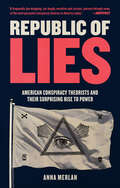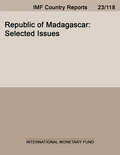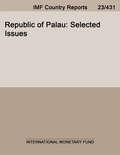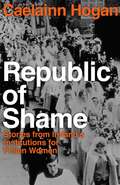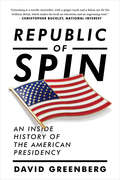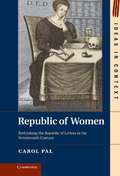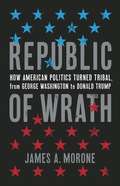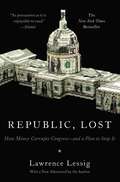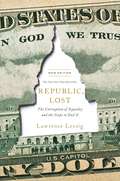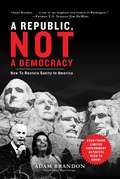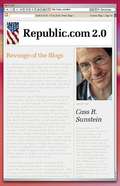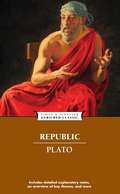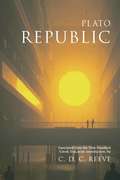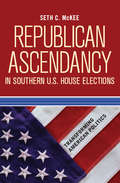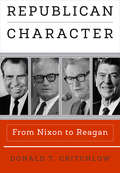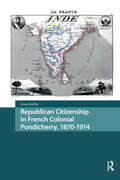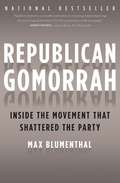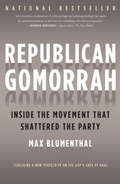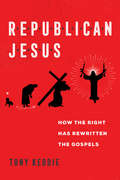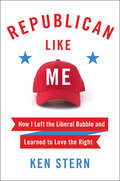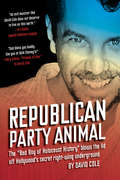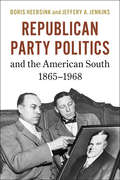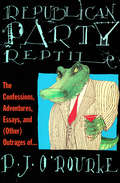- Table View
- List View
Republic of Lies: American Conspiracy Theorists and Their Surprising Rise to Power
by Anna Merlan“[An] engrossing assessment of the profitable mainstreaming of conspiracy mongering in civic and political life . . . A lucid look at a slippery topic.” —Kirkus ReviewsAmerican society has always been fertile ground for conspiracy theories, but with the election of Donald Trump, previously outlandish ideas suddenly attained legitimacy. Trump himself is a conspiracy enthusiast: From his claim that global warming is a Chinese hoax to the accusations of “fake news,” he has fanned the flames of suspicion.But it was not one man alone who gave these ideas increased power. Republic of Lies looks beyond the caricatures of conspiracy theorists to explain their tenacity. Without lending the theories validity, Anna Merlan gives a nuanced, sympathetic account of the people behind them, across the political spectrum, and the circumstances that helped them take hold. The lack of a social safety net, inadequate education, bitter culture wars, and years of economic insecurity have created large groups of people who feel forgotten by their government and even besieged by it. Our contemporary conditions are a perfect petri dish for conspiracy movements: a durable, permanent, elastic climate of alienation and resentment. All the while, an army of politicians and media figures have peddled fear to serve their own ends.Bringing together penetrating historical analysis and gripping on-the-ground reporting, Republic of Lies transforms our understanding of American paranoia.“A captivating book that illuminates the landscape of conspiracy theories and what they might say about society as a whole.” —New York Magazine
Republic of Lithuania: Third Review Under the Stand-By Arrangement--Staff Report; Press Release on the Executive Board Discussion; and Statement by the Executive Director for the Republic of Lithuania
by International Monetary FundA report from the International Monetary Fund.
Republic of Madagascar: Selected Issues (Imf Staff Country Reports #Country Report No. 15/25)
by International Monetary Fund. African Dept.A report from the International Monetary Fund.
Republic of Moldova: 2003 Article IV Consultation--Staff Report; and Public Information Notice on the Executive Board Discussion
by International Monetary FundA report from the International Monetary Fund.
Republic of Palau: Selected Issues (Imf Staff Country Reports #Country Report No. 14/111)
by International Monetary Fund. Asia and Pacific DeptA report from the International Monetary Fund.
Republic of Shame: Stories from Ireland's Institutions for 'Fallen Women'
by Caelainn Hogan'At least in The Handmaid's Tale they value babies, mostly. Not so in the true stories here' Margaret Atwood '[A] furious, necessary book' Sinéad GleesonUntil alarmingly recently, the Catholic Church, acting in concert with the Irish state, operated a network of institutions for the concealment, punishment and exploitation of 'fallen women'. In the Magdalene laundries, girls and women were incarcerated and condemned to servitude. And in the mother-and-baby homes, women who had become pregnant out of wedlock were hidden from view, and in most cases their babies were adopted - sometimes illegally. Mortality rates in these institutions were shockingly high, and the discovery of a mass infant grave at the mother-and-baby home in Tuam made news all over the world. The Irish state has commissioned investigations. But the workings of the institutions and of the culture that underpinned it - a shame-industrial complex - have long been cloaked in secrecy and silence. For countless people, a search for answers continues. Caelainn Hogan - a brilliant young journalist, born in an Ireland that was only just starting to free itself from the worst excesses of Catholic morality - has been talking to the survivors of the institutions, to members of the religious orders that ran them, and to priests and bishops. She has visited the sites of the institutions, and studied Church and state documents that have much to reveal about how they operated. Reporting and writing with great curiosity, tenacity and insight, she has produced a startling and often moving account of how an entire society colluded in this repressive system, and of the damage done to survivors and their families. In the great tradition of Anna Funder's Stasiland and Barbara Demick's Nothing to Envy: Real Lives in North Korea - both winners of the Samuel Johnson Prize - Republic of Shame is an astounding portrait of a deeply bizarre culture of control.'Achingly powerful ... There will be many people who don't want to read Republic of Shame, for fear it will be too much, too dark, too heavy. Please don't be afraid. Read it. Look it in the eye' Irish Times'A must read for everyone' Lynn Ruane'Republic of Shame is a careful, sensitive and extremely well-written book - but it is harrowing. It would break your heart in two' Ailbhe Smyth'Hogan's captivatingly written stories of people who were consigned to what she calls the "shame-industrial complex" puts faces - many old now, and lined with pain - to the clinical data ... Brilliant' Sunday Times'Utterly brilliant. Please read it' Marian Keyes'Riveting, immensely insightful and horrifically recognisable' Emma Dabiri'[A] sensitive, can't-look-away book ... Through moving stories, Hogan shows how the past is still present' NPR
Republic of Spin: An Inside History of the American Presidency
by David Greenberg<P>In Republic of Spin—a vibrant history covering more than one hundred years of politics—presidential historian David Greenberg recounts the rise of the White House spin machine, from Teddy Roosevelt to Barack Obama. His sweeping, startling narrative takes us behind the scenes to see how the tools and techniques of image making and message craft work. We meet Woodrow Wilson convening the first White House press conference, Franklin Roosevelt huddling with his private pollsters, Ronald Reagan’s aides crafting his nightly news sound bites, and George W. Bush staging his “Mission Accomplished” photo-op. We meet, too, the backstage visionaries who pioneered new ways of gauging public opinion and mastering the media—figures like George Cortelyou, TR’s brilliantly efficient press manager; 1920s ad whiz Bruce Barton; Robert Montgomery, Dwight Eisenhower’s canny TV coach; and of course the key spinmeisters of our own times, from Roger Ailes to David Axelrod. <P>Greenberg also examines the profound debates Americans have waged over the effect of spin on our politics. Does spin help our leaders manipulate the citizenry? Or does it allow them to engage us more fully in the democratic project? Exploring the ideas of the century’s most incisive political critics, from Walter Lippmann and H. L. Mencken to Hannah Arendt and Stephen Colbert, Republic of Spin illuminates both the power of spin and its limitations—its capacity not only to mislead but also to lead.
Republic of Women: Rethinking the Republic of Letters in the Seventeenth Century
by Carol PalRepublic of Women recaptures a lost chapter in the narrative of intellectual history. It tells the story of a transnational network of female scholars who were active members of the seventeenth-century republic of letters and demonstrates that this intellectual commonwealth was a much more eclectic and diverse assemblage than has been assumed. These seven scholars - Anna Maria van Schurman, Princess Elisabeth of Bohemia, Marie de Gournay, Marie du Moulin, Dorothy Moore, Bathsua Makin and Katherine Jones, Lady Ranelagh - were philosophers, schoolteachers, reformers and mathematicians. They hailed from England, Ireland, Germany, France and The Netherlands. And together with their male colleagues - men like Descartes, Huygens, Hartlib and Montaigne - they represented the spectrum of contemporary approaches to science, faith, politics and the advancement of learning. Carol Pal uses their collective biography to reconfigure the intellectual biography of early modern Europe, offering a new, expanded analysis of the seventeenth-century community of ideas.
Republic of Wrath: How American Politics Turned Tribal, From George Washington to Donald Trump
by James. A. MoroneA prize-winning political scientist untangles the deep roots of tribalism in America.American politics seems to be in an unprecedented uproar. But in this revelatory work of political history, James A. Morone shows that today's rancor isn't what's new -- the clarity of the battle lines is. Past eras were full of discord, but the most contentious question in American society -- Who are we? -- never split along party lines.Instead, each party reached out to different groups on the margins of power: immigrants, African Americans, and women. But, as the United States underwent profound societal transformations from the Civil War to the populist explosion to the Great Migration to civil rights to the latest era of immigration, the party alignment shifted. African Americans conquered the old segregationist party and Democrats slowly evolved into the party of civil rights, immigration, and gender rights. Republicans turned whiter and more nativist. The unprecedented party lineup now injects tribal intensity into every policy difference.Republic of Wrath tells the story of America as we've never heard it before, explaining the origins of our fractious times and suggesting how we might build a more robust republic.
Republic, Lost: How Money Corrupts Congress--and a Plan to Stop It
by Lawrence LessigIn an era when special interests funnel huge amounts of money into our government--driven by shifts in campaign-finance rules and brought to new levels by the Supreme Court in Citizens United v. Federal Election Commission--trust in our government has reached an all-time low. More than ever before, Americans believe that money buys results in Congress, and that business interests wield control over our legislature. With heartfelt urgency and a keen desire for righting wrongs, Harvard law professor Lawrence Lessig takes a clear-eyed look at how we arrived at this crisis: how fundamentally good people, with good intentions, have allowed our democracy to be co-opted by outside interests, and how this exploitation has become entrenched in the system. Rejecting simple labels and reductive logic-and instead using examples that resonate as powerfully on the Right as on the Left-Lessig seeks out the root causes of our situation. He plumbs the issues of campaign financing and corporate lobbying, revealing the human faces and follies that have allowed corruption to take such a foothold in our system. He puts the issues in terms that nonwonks can understand, using real-world analogies and real human stories. And ultimately he calls for widespread mobilization and a new Constitutional Convention, presenting achievable solutions for regaining control of our corrupted-but redeemable-representational system. In this way, Lessig plots a roadmap for returning our republic to its intended greatness. While America may be divided, Lessig vividly champions the idea that we can succeed if we accept that corruption is our common enemy and that we must find a way to fight against it. In REPUBLIC, LOST, he not only makes this need palpable and clear-he gives us the practical and intellectual tools to do something about it.
Republic, Lost: Version 2.0
by Lawrence LessigRevised and updated for the 2016 election with 75% new material. @font-face { font-family: "Times"; }@font-face { font-family: "Geneva"; }p.MsoNormal, li.MsoNormal, div.MsoNormal { margin: 0in 0in 0.0001pt; font-size: 12pt; font-family: "Times New Roman"; color: black; }div.Section1 { page: Section1; } In an era when special interests funnel huge amounts of money into our government-driven by shifts in campaign-finance rules and brought to new levels by the Supreme Court in Citizens United v. Federal Election Commission-trust in our government has reached an all-time low. More than ever before, Americans believe that money buys results in Congress, and that business interests wield control over our legislature. With heartfelt urgency and a keen desire for righting wrongs, Harvard law professor Lawrence Lessig takes a clear-eyed look at how we arrived at this crisis: how fundamentally good people, with good intentions, have allowed our democracy to be co-opted by outside interests, and how this exploitation has become entrenched in the system. Rejecting simple labels and reductive logic-and instead using examples that resonate as powerfully on the Right as on the Left-Lessig seeks out the root causes of our situation. He plumbs the issues of campaign financing and corporate lobbying, revealing the human faces and follies that have allowed corruption to take such a foothold in our system. He puts the issues in terms that nonwonks can understand, using real-world analogies and real human stories. And ultimately he calls for widespread mobilization and a new Constitutional Convention, presenting achievable solutions for regaining control of our corrupted-but redeemable-representational system. In this way, Lessig plots a roadmap for returning our republic to its intended greatness. While America may be divided, Lessig vividly champions the idea that we can succeed if we accept that corruption is our common enemy and that we must find a way to fight against it. In REPUBLIC, LOST, he not only makes this need palpable and clear-he gives us the practical and intellectual tools to do something about it.
Republic, Not a Democracy: How to Restore Sanity in America
by Adam BrandonLet Adam Brandon, one of America&’s leading activists, explain the past, the present, and the future of American conservatism, and offer advice from his unique perspective on how to bridge the generational and political divides in the United States for a better future.America faces incredibly consequential choices over the direction of the nation. Far-left Democrats who label themselves as &“progressives&” want to shatter constitutional norms and move America backward through command-and-control economic policies while continuing to divide us with identity politics.In A Republic, Not a Democracy, FreedomWorks President Adam Brandon draws on his experiences from when he was a kid in Ohio, his time in post-communist Poland, and his current role in Washington, DC to offer perspective on the choices that America has before it. He uses these experiences to provide a unique take on how to win voters with a pro-growth message on economic policy. Drawing on the story of 2019—when America saw its lowest unemployment rate in a half-century and a record low poverty rate—Adam explains how we can restore America in a post-COVID-19 pandemic world. He highlights key policy issues like education, health care, and the age-demographic crisis and what lawmakers can do to address these problems. As president of the country&’s largest free-market grassroots advocacy organization, Adam is the nation&’s foremost expert in effective grassroots strategy. He uses this expertise to explain the importance of grassroots activists and using these committed constitutionalists to change the minds of lawmakers in the Swamp. A Republic, Not a Democracy is an essential resource for anyone seeking to understand the state of modern politics, for anyone who wants to use grassroots activism to make a difference in the world, and for anyone who wonders about what the future holds for America and its citizens.
Republic.com 2.0
by Cass R. SunsteinWhat happens to democracy and free speech if people use the Internet to listen and speak only to the like-minded? What is the benefit of the Internet's unlimited choices if citizens narrowly filter the information they receive? Cass Sunstein first asked these questions in 2001'sRepublic. com. Now, inRepublic. com 2. 0, Sunstein thoroughly rethinks the critical relationship between democracy and the Internet in a world where partisan Weblogs have emerged as a significant political force. Republic. com 2. 0highlights new research on how people are using the Internet, especially the blogosphere. Sunstein warns against "information cocoons" and "echo chambers," wherein people avoid the news and opinions that they don't want to hear. He also demonstrates the need to regulate the innumerable choices made possible by technology. His proposed remedies and reforms emphasize what consumers and producers can do to help avoid the perils, and realize the promise, of the Internet.
Republic: Book Vii (Enriched Classics)
by PlatoWidely acknowledged as his most influential work, Republic presents Plato's philosophical views on the nature of justice and his vision for the ideal state. THIS ENRICHED CLASSIC EDITION INCLUDES: A concise introduction that gives the reader important background information A chronology of the author's life and work A timeline of significant events that provides the book's historical context An outline of key themes to guide the reader's own interpretations Detailed explanatory notes Critical analysis and modern perspectives on the work Discussion questions to promote lively classroom and book group interaction A list of recommended related books and films to broaden the reader's experience Simon & Schuster Enriched Classics offer readers affordable editions of great works of literature enhanced by helpful notes and insightful commentary. The scholarship provided in Enriched Classics enables readers to appreciate, understand, and enjoy the world's finest books to their full potential.
Republic: Critical Essays (Hackett Classics)
by Plato C. D. ReeveThis edition includes a select bibliography, a synopsis of each book, a glossary of terms, a glossary and index of names, and a general index. "Reeve's new translation of Republic is the one to order for students. . . . Reeve draws on his thorough understanding of Plato's central work to provide an informed translation and properly brief supporting apparatus. A highlight is the concise, substantive Introduction that usefully encapsulates much of Reeve's own scholarship." —P.W. Wakefield, in CHOICE
Republican Ascendancy in Southern U.S. House Elections (Transforming American Politics (4th Edition))
by Seth C. McKeeTremendous transformation marks the last three decades of American politics, and nowhere has this change been as distinctive and penetrating as in the American South. After 120 consecutive years of minority status, the rapid ascendancy of Southern House Republicans in the 1990s has reshaped the contours of contemporary American politics: increasing party polarization, making a Republican House majority possible, and, most recently, contributing to the revival of Democratic fortunes in national congressional elections. Southern Republican ascendancy constitutes an exemplar of party system change, made possible by three sequential factors: increasing Republican identification, redistricting, and the emergence of viable Republican candidates. Relying on existing and original data sources, this text presents the most recent example of large-scale partisan change. Beyond serving as a primer for the study of political parties, campaigns and elections, and Southern politics, Republican Ascendancy in Southern U.S. House Elections provides an original theoretical argument and an expansive view of why political change in the South has such strong implications for national politics.
Republican Character: From Nixon to Reagan
by Donald T. Critchlow"Politics makes for strange bedfellows," the old saying goes. Americans, however, often forget the obvious lesson underlying this adage: politics is about winning elections and governing once in office. Voters of all stripes seem put off by the rough-and-tumble horse-trading and deal-making of politics, viewing its practitioners as self-serving and without principle or conviction.Because of these perspectives, the scholarly and popular narrative of American politics has come to focus on ideology over all else. But as Donald T. Critchlow demonstrates in his riveting new book, this obsession obscures the important role of temperament, character, and leadership ability in political success. Critchlow looks at four leading Republican presidential contenders—Richard Nixon, Nelson Rockefeller, Barry Goldwater, and Ronald Reagan—to show that, behind the scenes, ideology mattered less than principled pragmatism and the ability to build coalitions toward electoral and legislative victory.Drawing on new archival material, Critchlow lifts the curtain on the lives of these political rivals and what went on behind the scenes of their campaigns. He reveals unusual relationships between these men: Nixon making deals with Rockefeller, while Rockefeller courted Goldwater and Reagan, who themselves became political rivals despite their shared conservatism. The result is a book sure to fascinate anyone wondering what it takes to win the presidency of the United States—and to govern effectively.
Republican Citizenship in French Colonial Pondicherry, 1870-1914 (Asian History)
by Anne RaffinRepublican Citizenship in French Colonial Pondicherry, 1870-1914 revisits and analyses the earlier part of the Third Republic, when France granted citizenship rights to Indians in Pondicherry. This work of historical sociology explores the nature of this colonial citizenship and enables comparisons with British India, especially the Madras Presidency, as well as the rest of the French empire, as a means of demonstrating how unique the practice of granting such rights was. The difficulties of implementing a new political culture based on the language of rights and participatory political institutions were not so much rooted in a lack of assimilation into the French culture on the part of the Indian population. Rather, they were the result of political infighting and long-term conflicts over status, both in relation to caste and class, and between inclusive and exclusive visions of French citizenship.
Republican Gomorrah: Inside the Movement That Shattered the Party
by Max BlumenthalOver the last year, award-winning journalist and videographer Max Blumenthal has been behind some of the most sensational (and funniest) exposes of Republican machinations. Whether it was his revelation that Sarah Palin was "anointed" by a Kenyan priest famous for casting out witches, or his confronting Republican congressional leaders and John McCain's family at the GOP convention about the party's opposition to sex education (and hence, the rise in teen pregnancies like that of Palin's daughter), or his expose of the eccentric multimillionaire theocrat behind California's Prop 8 anti-gay marriage initiative, Blumenthal has become one of the most important and most constantly cited journalists on how fringe movements are becoming the Republican Party mainstream.Republican Gomorrah is a bestiary of dysfunction, scandal and sordid mess from the dark heart of the forces that now have a leash on the party. It shows how those forces are the ones that establishment Republicans-- like John McCain-- have to bow to if they have any hope of running for President. It shows that Sarah Palin was the logical choice of a party in the control of theocrats. But more that just an expose, Republican Gomorrah shows that many of the movement's leading figures have more in common than just the power they command within conservative ranks. Their personal lives have been stained by crisis and scandal: depression, mental illness, extra-marital affairs, struggles with homosexual urges, heavy medication, addiction to pornography, serial domestic abuse, and even murder. Inspired by the work of psychologists Erich Fromm, who asserted that the fear of freedom propels anxiety-ridden people into authoritarian settings, Blumenthal explains in a compelling narrative how a culture of personal crisis has defined the radical right, transforming the nature of the Republican Party for the next generation and setting the stage for the future of American politics.
Republican Gomorrah: Inside the Movement that Shattered the Party
by Max BlumenthalOver the last year, award-winning journalist and videographer Max Blumenthal has been behind some of the most sensational (and funniest) exposes of Republican machinations. Whether it was his revelation that Sarah Palin was "anointed" by a Kenyan priest famous for casting out witches, or his confronting Republican congressional leaders and John McCain's family at the GOP convention about the party's opposition to sex education (and hence, the rise in teen pregnancies like that of Palin's daughter), or his expose of the eccentric multimillionaire theocrat behind California's Prop 8 anti- gay marriage initiative, Blumenthal has become one of the most important and most constantly cited journalists on how fringe movements are becoming the Republican Party mainstream.Republican Gomorrah is a bestiary of dysfunction, scandal and sordidness from the dark heart of the forces that now have a leash on the party. It shows how those forces are the ones that establishment Republicans-like John McCain-have to bow to if they have any hope of running for President. It shows that Sarah Palin was the logical choice of a party in the control of theocrats. But more that just an expose, Republican Gomorrah shows that many of the movement's leading figures have more in common than just the power they command within conservative ranks. Their personal lives have been stained by crisis and scandal: depression, mental illness, extra-marital affairs, struggles with homosexual urges, heavy medication, addiction to pornography, serial domestic abuse, and even murder. Inspired by the work of psychologists Erich Fromm, who asserted that the fear of freedom propels anxiety-ridden people into authoritarian settings, Blumenthal explains in a compelling narrative how a culture of personal crisis has defined the radical right, transforming the nature of the Republican Party for the next generation and setting the stage for the future of American politics.
Republican Jesus: How the Right Has Rewritten the Gospels
by Tony KeddieThe complete guide to debunking right-wing misinterpretations of the Bible—from economics and immigration to gender and sexuality.Jesus loves borders, guns, unborn babies, and economic prosperity and hates homosexuality, taxes, welfare, and universal healthcare—or so say many Republican politicians, pundits, and preachers. Through outrageous misreadings of the New Testament gospels that started almost a century ago, conservative influencers have conjured a version of Jesus who speaks to their fears, desires, and resentments. In Republican Jesus, Tony Keddie explains not only where this right-wing Christ came from and what he stands for but also why this version of Jesus is a fraud. By restoring Republicans’ cherry-picked gospel texts to their original literary and historical contexts, Keddie dismantles the biblical basis for Republican positions on hot-button issues like Big Government, taxation, abortion, immigration, and climate change. At the same time, he introduces readers to an ancient Jesus whose life experiences and ethics were totally unlike those of modern Americans, conservatives and liberals alike.
Republican Like Me: How I Left the Liberal Bubble and Learned to Love the Right
by Ken SternIn this controversial National Bestseller, the former CEO of NPR sets out for conservative America wondering why these people are so wrong about everything. It turns out, they aren’t.Ken Stern watched the increasing polarization of our country with growing concern. As a longtime partisan Democrat himself, he felt forced to acknowledge that his own views were too parochial, too absent of any exposure to the “other side.” In fact, his urban neighborhood is so liberal, he couldn’t find a single Republican--even by asking around. So for one year, he crossed the aisle to spend time listening, talking, and praying with Republicans of all stripes. With his mind open and his dial tuned to the right, he went to evangelical churches, shot a hog in Texas, stood in pit row at a NASCAR race, hung out at Tea Party meetings and sat in on Steve Bannon’s radio show. He also read up on conservative wonkery and consulted with the smartest people the right has to offer. What happens when a liberal sets out to look at issues from a conservative perspective? Some of his dearly cherished assumptions about the right slipped away. Republican Like Me reveals what lead him to change his mind, and his view of an increasingly polarized America.
Republican Party Animal
by David Cole"David Stein brought right-wing congressmen, celebrities, writers and entertainment industry figures together for shindigs, closed to outsiders. . . . There was just one problem. Stein was not who he claimed."-The GuardianIn 2013, Republican "hero" David Stein made international headlines when he was unmasked as David Cole, the notorious Jewish Holocaust denier who made an entirely different set of headlines in the 1990s with his videos from within the gates of Auschwitz and his appearances on shows like 60 Minutes and Donahue.After a $25,000 bounty was put on his head by a violent extremist group, Cole left behind the bizarre world of Holocaust denial, a landscape populated by Hitler fetishists who Cole himself detested. Then, David Stein the Republican organizer was born.Stein soon became a major force in the closed-door world of Hollywood right-wingers-people who felt as alienated from the mainstream of their profession as Cole had felt as the lone Jewish Holocaust revisionist. Soon enough, Stein was working with major GOP power players and far-right Hollywood A-listers, creating huge private events for the West Coast GOP elite . . . until it all came crashing down when a vengeful former girlfriend outed him publicly.Condemned by those who had previously lauded him, Cole was left with nothing but his story. And here he tells it, warts and all, including the first-ever exposé of the secretive Hollywood far-right underground, "Friends of Abe."
Republican Party Politics and the American South, 1865–1968
by Jeffery A. Jenkins Boris HeersinkIn Republican Party Politics and the American South, 1865–1968, Heersink and Jenkins examine how National Convention politics allowed the South to remain important to the Republican Party after Reconstruction, and trace how Republican organizations in the South changed from biracial coalitions to mostly all-white ones over time. Little research exists on the GOP in the South after Reconstruction and before the 1960s. Republican Party Politics and the American South, 1865–1968 helps fill this knowledge gap. Using data on the race of Republican convention delegates from 1868 to 1952, the authors explore how the 'whitening' of the Republican Party affected its vote totals in the South. Once states passed laws to disenfranchise blacks during the Jim Crow era, the Republican Party in the South performed better electorally the whiter it became. These results are important for understanding how the GOP emerged as a competitive, and ultimately dominant, electoral party in the late-twentieth century South.
Republican Party Reptile: The Confessions, Adventures, Essays and (Other) Outrages of . . . P. J. O'Rourke
by P. J. O'Rourke"I think our agenda is clear. We are opposed to: government spending, Kennedy kids, seat-belt laws, busing our children anywhere other than Yale, trailer courts near our vacation homes, all tiny Third World countries that don't have banking secrecy laws, aerobics, the UN, taxation without tax loopholes, and jewelry on men. We are in favor of: guns, drugs, fast cars, free love (if our wives don't find out), a sound dollar, and a strong military with spiffy uniforms. There are thousands of people in America who feel this way, especially after three or four drinks. If all of us would unite and work together, we could give this country. . . well, a real bad hangover."
